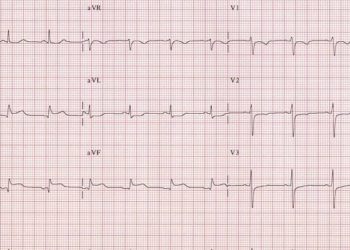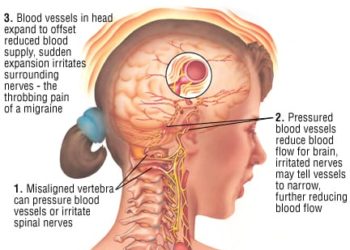Erenumab linked to decreased episodic migraine frequency: The STRIVE trial
1. Monthly injections of erenumab were associated with reduced migraine frequency, decreased use of acute migraine medication, and decreased migraine burden on daily activities compared to placebo among patients with episodic migraines.
2. The overall safety profile of erenumab in this trial was comparable to placebo with regards to the types and severity of adverse events assessed.
Evidence Rating Level: 1 (Excellent)
Study Rundown: Migraines pose a significant burden on the quality of life of adults affected. Many currently approved acute migraine-specific medications are either abortive or are cited as having poor treatment adherence, unwanted side effects, or reduced effectiveness. Erenumab, a calcitonin gene-related peptide (CGRP) receptor modulator, is being evaluated as a new potential preventative treatment option for adults with migraine activity. In the Study to Evaluate the Efficacy and Safety of Erenumab in Migraine Prevention (STRIVE) trial, a 6-month course of erenumab was compared to placebo in a population of patients with episodic migraine activity. The primary endpoint was change in the mean number of migraine days per month from baseline to months 4-6 of treatment. Overall, researchers found significant reductions in the mean number of migraine days per month in the erenumab group compared to placebo, suggesting that erenumab may be a useful therapy for the prevention of episodic migraines. Further studies on the safety and long-term effects of erenumab need to be conducted to further elucidate its role in migraine treatment.
Click to read the study, published in NEJM
Relevant Reading: CGRP, a target for preventative therapy in migraine and cluster headache: Systematic review of clinical data
In-Depth [randomized controlled trial]: This multinational phase 3 randomized controlled study included 955 adults patients with episodic migraine into three treatment arms: 70 mg erenumab (n = 317), 140 mg erenumab (n = 319), or placebo (n = 319) groups. Each arm received monthly subcutaneous injections of their assigned treatment arm. The primary endpoint was change in mean number of migraine days from baseline to the studies end and key secondary endpoints included changes in the number of days of acute migraine-specific medication use, evidence of 50% or greater reduction in the number of mean migraine days per month, and changes in physical-impairment and daily functioning from baseline to the final three months of treatment. The reduction of mean migraine days per month was 3.2 days in the 70 mg erenumab treatment group (95%CI, -1.9 to -0.9; p < 0.001) and 3.7 days in the 140 mg erenumab group (95%CI, -2.3 to -1.4; p < 0.001) compared to 1.8 days in the placebo group. The odds of having a 50% or greater reduction in migraine activity was 2.13 in the 70 mg erenumab group (OR, 1.52 to 2.98; p < 0.001) and 2.81 in the 140 mg erenumab group (OR, 2.01 to 3.94; p < 0.001) compared to placebo. Fewer mean number of days patients used acute migraine-specific medications per month was seen in the treatment arms (1.1 fewer days with 70 mg erenumab, 1.6 with 140 mg erenumab, 0.2 with placebo; p < 0.001 for each arm vs placebo). Improvements in physical-impairment and daily functioning were significantly greater in both treatment arms compared to placebo (p < 0.001 for both comparisons). Serious adverse events occurred 7, 8, and 7 times in the placebo, 70 mg treatment, and 140 mg treatment arms, respectively. The most common reported adverse events across all study arms included nasopharyngitis and upper respiratory infection. Of 628 patients who were tested for antibodies, 35 (5.6%) tested positive for anti-erenumab antibodies (8.0% in the 70 mg group, 3.2% in the 140 mg group).
Image: PD
©2017 2 Minute Medicine, Inc. All rights reserved. No works may be reproduced without expressed written consent from 2 Minute Medicine, Inc. Inquire about licensing here. No article should be construed as medical advice and is not intended as such by the authors or by 2 Minute Medicine, Inc.









